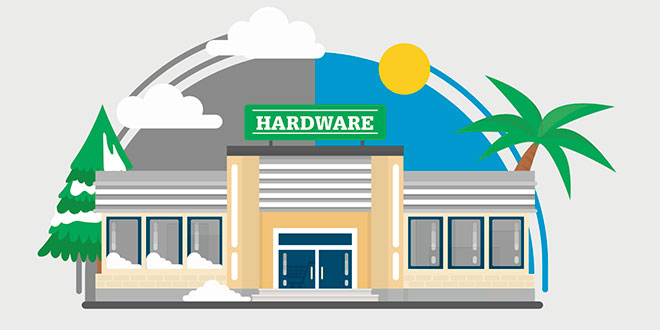Every retailer faces their own set of challenges. Suburban retailers may worry development is heating up away from the place they’ve called home for years. Urban retailers may fret over where to store a high-volume shipment without sacrificing space. No matter where you do business, unique challenges arise that keep you searching for ways to stay nimble.
Other retailers have wholly unique concerns that permeate every aspect of their business. Whether planning deliveries to a hard-to-reach locale or safeguarding their operation from the ravages of hurricanes, remote retailers’ success depends on staying resourceful and handling everything Mother Nature, shipping schedules and customers send their way.
The constant drive to meet customer needs and provide your neighbors with the products they need unites all hardware retailers, no matter where they call home.
Robert Alred and Erik deBoer operate home improvement businesses more than 4,200 miles apart, and though their climates may be different, they share many of the same concerns. As owner of Ace Hardware Top of the World in Utqiagvik, Alaska, Alred battles frigid temperatures and lengthy shipping delays while overseeing a young but vital business. In Key West, Florida, Manley deBoer Lumber Co. managing partner deBoer relies on his decades of home improvement experience and a resilient spirit to keep his operation the premium choice for locals. Discover how both retailers are adapting to serve their communities.
Utqiagvik, Alaska
Robert Alred, owner of Ace Hardware Top of the World, says he knows more about retail success with every passing day.
He and store manager Herman Solomon were born and raised in Utqiagvik, Alaska, a town of approximately 4,300 and situated in northern Alaska at the very edge of the U.S. There are no roads in or out of the town also known as Barrow; instead, locals rely on a network of 30 to 40 miles of unpaved roads within the town to work, hunt and shop.
“It’s a different kind of town, but it’s home to us,” Alred says.
Utqiagvik is a land of extremes. In the coldest months, the average low temperature can tumble to minus 20 F. The town’s location also enables locals to experience two solar spectacles each year. In mid-November, the sun sets and remains below the horizon for more than two months, cloaking the town in darkness. In mid-May, the sun rises fully above the horizon and won’t set again until August, bathing the town in constant daylight for 10 weeks.
Before opening the business two years ago, Alred had been working in plumbing and heating, and Solomon worked as a carpenter. After Utqiagvik’s only hardware store closed, locals had to place orders from out of town, which was an often costly and lengthy process.
“If you needed screws, you had to place an order and wait a few weeks before you’d see them,” he says. “We saw an opportunity in the town.”
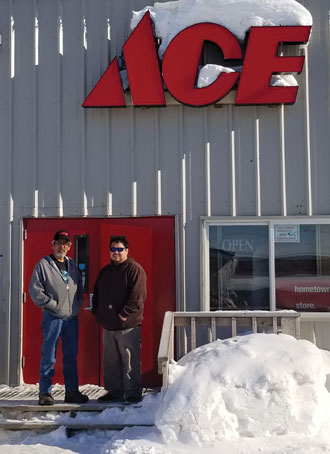
The Freight Factor
Ace Hardware Top of the World enjoys a perk many retailers would envy: Its nearest big-box rivals are 500 miles away. But that distance from well-funded marketing campaigns and deep inventory comes at a steep price.
Without roads in or out of the town, Alred and Solomon say all products must be flown in to Utqiagvik. Most of their shipments originate from Seattle, where their cargo is placed on a barge and taken to Anchorage, the closest hub at more than 700 miles away. There, the shipment is repackaged for air travel and then flown directly to Utqiagvik. In all, it can take three to four weeks to order a shipment and see it arrive at the operation.
“It’s sometimes frustrating,” Alred says. “Whenever we have an event in-store, we have to plan well in advance. One Christmas, we had lots of gifts arrive after the holiday due to a freight situation. But it is what it is; we have to do more preplanning on our end.”
Both men say the business fulfills a necessary role in the community. It currently employs five people and stocks all the core categories of a hardware store. Due to its remote location, Alred says many locals have grown to be self-reliant, innate DIYers who want to tackle their home improvement projects themselves.
“Everybody here wants to work on something,” he says. “Everyone has the weekends to work on projects, and we have what they need to do it.”
Solomon says paint is the business’s best-selling product, but the classic Ace 5-gallon buckets aren’t far behind.
The business also hosts events whenever possible. In the past, they’ve seen success with bucket sales and are planning a Father’s Day event next month. In March 2018, the business hosted a one-year anniversary party. While Alred and Solomon are still relatively new to retail, they know events like these are key.
“We try to do events when we can,” Alred says. “But there’s a learning curve. There’s such a long waiting period for supplies, but we know we want to do more events.”
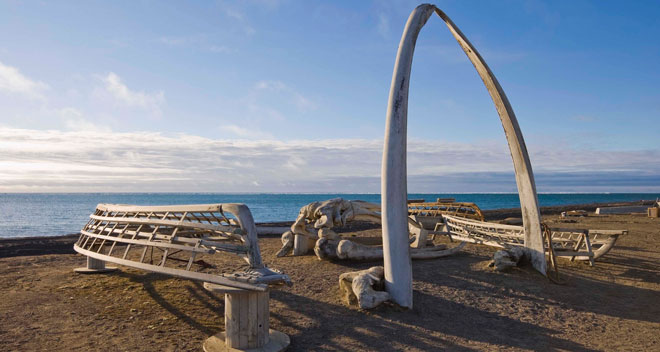
A Whale of a Time
As Alred and his team settle into retail, they’re eyeing future opportunities to help the business grow and best serve Utqiagvik. Currently, the business doesn’t have room to stock lumber, but Alred says he’d like to possibly change that in the years ahead. He’s also considering getting into the whaling category.
“We have a pretty big hunting and whaling community here,” he says. “We’re trying to get more focused in that area.” Whaling success will mean the business dives deep into stocking hooks, ropes, knives and cooking pots to become a one-stop shopping source for locals.
Even with shipment delays, biting cold and long stretches of night or day, Alred and the rest of the Ace Hardware Top of the World team are committed to success, inspired by the people who call Utqiagvik home. No matter what he and the team decide to do, Alred says the focus will always be on understanding the needs of his community better.
“My favorite part of retail is helping my community,” Alred says. “I like seeing everyone work on their projects and get them completed. Whether they’re fixing doors or painting their rooms, we have the products they need.”
Key West, Florida
Erik deBoer, managing partner of Key West, the southernmost city in the contiguous U.S., is thankful for plentiful sun and clear skies over Key West, Florida.
He first came to the city immediately after graduating high school in 1971, working as a contractor with his friend and business partner Richard Manley. The two specialized in historic building preservation, which was plentiful around the island.
“Key West was quite a bit different from what I was anticipating,” he says. “When I came here for the first time, I thought it would be a tiny place with a few streets, but it’s really a self-sustaining small town.”
Key West, the southernmost city in the contiguous U.S., is divided roughly in half: The newest section is home to an array of big boxes and national chains, while the other half is one of the largest historic districts in the U.S., protected by a framework of laws aimed at preserving the history and culture of the region. For 17 years, the two business partners worked around the island, helping maintain homes and buildings that had weathered sun and storm for decades.
deBoer says he doesn’t consider Key West a remote location—the city has an international airport, and in just three hours, he can drive to the neon Miami coastline. But, he does acknowledge the city has logistical vulnerabilities.
“I guess it is remote in that we’re 100 miles from the mainland, but it doesn’t feel inaccessible. Our lifeline is continuous: We’ve got a string of highway and bridges, we’ve got a freshwater pipeline and electricity that emanates from the mainland. But the key transportation and infrastructure elements that make Key West livable are all a daisy chain,” he says.
That connection to the mainland was tested in 2017, when hurricane-force winds were gathering off the coast of West Africa and growing closer to Key West and the Manley deBoer Lumber Co.
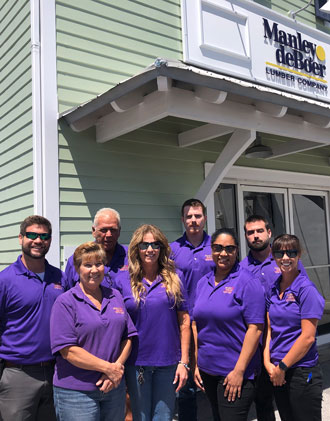
Surviving Hurricane Irma
In 1997, deBoer and Manley bought a lumberyard and the Manley deBoer Lumber Co. officially began. In 2006, the pair decided to open a second location, about 30 miles east on Big Pine Key.
deBoer says the decision to open a second location came easily. In the partners’ minds, a second location enabled the company to reach new customers and stake a greater claim in the independent home improvement market of southern Florida.
In September 2017, Hurricane Irma was gathering strength over the Atlantic Ocean, charting a course toward the Florida Keys. Original predictions estimated the hurricane would hit Key West directly, but in the end, it was Big Pine Key that was most affected by the 100 mph winds.
“The Key West lumberyard opened up about two days after the hurricane,” deBoer says. “But Big Pine Key was a different story. It was the worst storm to hit the Keys in the 40-something years I’ve lived here.”
The Big Pine Key location was almost completely destroyed by the hurricane. Forklifts, lumber and trucks were all ruined. What wasn’t flooded at the business was damaged by corrosive saltwater spray.
Many employees’ homes were destroyed by the hurricane. As a final blow, Manley had been cleaning up his home after the hurricane hit when he suffered a fatal injury.
Suddenly, deBoer was tasked with getting the operation back on its feet without the business partner he had trusted for decades.
deBoer credits the employees for volunteering to clean what they could after the storm cleared, an action that helped stabilize the business in an uncertain time. In March 2018, the Big Pine Key location reopened for business.
“Every single employee was amazing throughout the hurricane,” he says. “Once people had secured their own homes, they immediately wondered what they could do to help the business.”
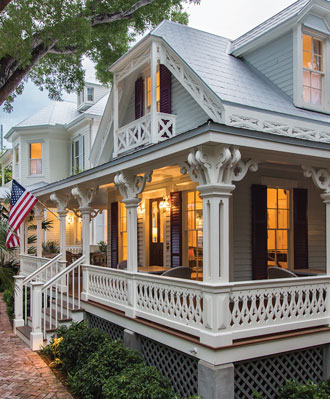
A Sense of History
deBoer says the lumberyard’s location in the city’s historic district influences its inventory. A big-box competitor operates in New Town, but deBoer says the lumberyard’s customer base enables it to stock specialized products national chains don’t carry.
“We have a locational advantage for people who live in the historic district,” he says. “There’s a very distinct difference in the materials that go into historic houses versus new construction. Our historic district has a lot of regulatory protection to get a building permit.”
deBoer says his lumberyard and another local independent home improvement business have the specialized materials owners of historic homes need to fulfill all historic building guidelines. From wood siding to windows and trim, deBoer says stocking materials for historic properties serves as a competitive advantage.
“What we find is that big boxes aren’t really geared toward fine-tuning inventory from store to store,” he says. “So the big box in Key West has the same stuff on the shelves as the one in Naples. Our willingness to stock items for historic preservation and our background as contractors really help us.”
He says one of the biggest obstacles to operating in Key West is the increased price of goods that must be transported to Key West, but he feels relieved the big boxes must shoulder that extra cost as well.
As the busy vacation and home improvement season begins, deBoer says the lumberyard team is looking for calm waters. deBoer is 67 years old and now considering a time when he won’t be working at the business as intensely. He recently brought on his son-in-law to help manage the lumberyard, which is still a partnership with the Manley family.
“This past year has been a year of rebuilding and figuring out how to move forward without Richard,” deBoer says. “In terms of having a succession plan in place that enables the Manley family and my own to benefit and thrive and grow, I’m seeing the light at the end of the tunnel.”
 Hardware Retailing The Industry's Source for Insights and Information
Hardware Retailing The Industry's Source for Insights and Information

